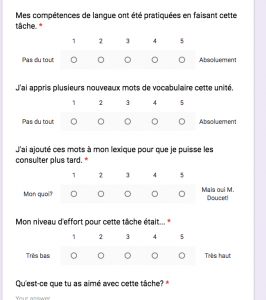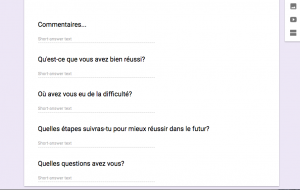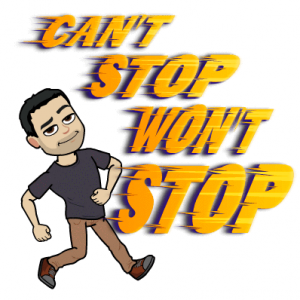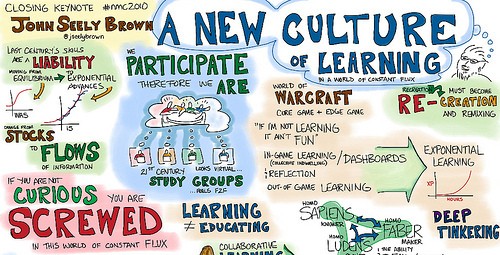 As a bilingual Canadian the French programs in English schools have always frustrated me. I never understood how so many people could graduate from schools after having taken 9-10 years of French. I am so thankful that French was spoken at home and my years leading up to high school were at French schools. When I got my degree, I vowed to change the system – make it better for student speaking and get away from grammar focused lessons, and I’ve never looked back!
As a bilingual Canadian the French programs in English schools have always frustrated me. I never understood how so many people could graduate from schools after having taken 9-10 years of French. I am so thankful that French was spoken at home and my years leading up to high school were at French schools. When I got my degree, I vowed to change the system – make it better for student speaking and get away from grammar focused lessons, and I’ve never looked back!
Fast forward 4 years from my very first action plan and I have to say that this one feels so much less groundbreaking. After discussing the issue with @marsenault & @timrollwagen about this, we’ve arrived that we’ve grown a great deal as educators since our first C21 introduction and so changes seem to be less impactful, at least in my mind…
Thanks to @lesmcbeth and her use of DocAppender – the add-on we were introduced to at GAFE in Montreal, I jumped on the wagon!
 “How might we improve oral communication with just in time feedback?”
“How might we improve oral communication with just in time feedback?”
Creating multiple forms for different purposes; was priority #1. A performance based form with success criteria and reflective questions, a peer assessment form, a self-assessment form and a general feedback form were created based on great conversations with @lmcbeth and others, I was off and running.

Key Learnings albeit not earth shattering were:
- Time spent sharing & reflecting is time well spent – this is where students consolidate and learn from one another. This is where we improve their metacognition and within a personalized learning this is crucial for establishing next steps.
- Obviously consistency is key but I think it’s difficult in a larger group to get to everyone. Circulating with a laptop and listening – really listening and figuring out what is the biggest thing they need to work on takes time. I’ve recently heard about having DocAppender on your phone with voice comments – which is something I will definitely be exploring in greater detail. Especially since Easy Portfolio is not very well supported.
- Students love feedback! For now they are focused on number feedback but as I mentioned in my previous blog – I think it’s because this is the first time I’ve taught these students. It’s so vastly different than their norm but they’re coming around in our latest Design Thinking unit where their attempting to solve a world issue in a francophone region of the world.
- Continue to use Forms for feedback. Look for efficiencies in creating docs. One document per unit is about right with respect to the length of the document and reviewability if that’s a word.
- Use Can Do Statements so that curriculum is more in line with CEFR – thanks @jenbibby for looking through my stuff and providing feedback!
- Move toward a more Standard Based Assessment model – thanks to @clovrics & @ehitchcock
As a third year Cohorter (1 as a participant & 2 as a facilitator, I’m still blown away by how valuable the experience and community are to my continued professional and personal growth. I learn so much from reading the blogs, engaging in conversations and we get to meet some pretty amazing people who just happen to be excellent and forward thinking teachers. I’m in awe of the Coaches and Facilitators with whom I get to work closely, and it never gets old – I am constantly learning and for this I thank you! More to come and looking forward to connecting in Hamilton!



As a third year Cohorter (1 as a participant & 2 as a facilitator, I’m still blown away by how valuable the experience and community are to my continued professional and personal growth. I learn so much from reading the blogs, engaging in conversations and we get to meet some pretty amazing people who just happen to be excellent and forward thinking teachers. I’m in awe of the Coaches and Facilitators with whom I get to work closely, and it never gets old – I am constantly learning and for this I thank you! More to come and looking forward to connecting in Hamilton!
Derek – I copied part of your post into mine as I have to echo everything you’ve shared but obviously not as a participant. From my perspective, while I am not a direct participant at Cohort, I have watched the Cohort experience impact teaching at our school. Each of you have returned to LCS as reflective practitioners (not that you weren’t already) and have in many cases promoted great excitement with your colleagues. Looking at amazing posts from Tim, Alaina and Mike, I know the Cohort experience has been transformational. Thank you all for your amazing dedication, time and for returning to our school and spreading the love!
Thanks Struan! It’s great when our school leadership supports growth and development in its faculty and staff! Your approach to improving learning at our school has ignited a fire in many of us and we’re just so lucky to have had the chance to be supported and nudged to make things better!
@ddoucet It is not every head of school that would take the time to read and comment on cohort blogs…..but you already know that 🙂
It certainly isn’t @jmedved, but he’s one of kind! I’ve learned so much from him and he’s been so supportive in my growth as an educator. What more could you ask for in a Head of School?
Hey Derek,
I want to know more about how you use the feedback document with the students. I have played with DocAppender a bit this year for collecting multiple sources of feedback, but I didn’t manage to use the results meaningfully. Let’s talk more in the future about how you use the results – as Math and French are often so similar, I’m sure you’ll have some good ideas for me!
Yes @reichholtz! I’d love to share and hear more about how you use these tools as well! Then we can collectively come up with something amazing!! Let’s connect soon!